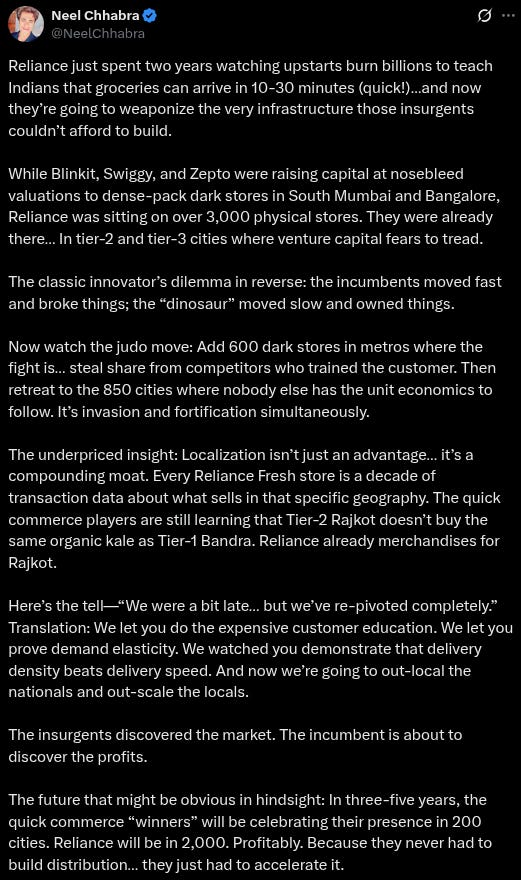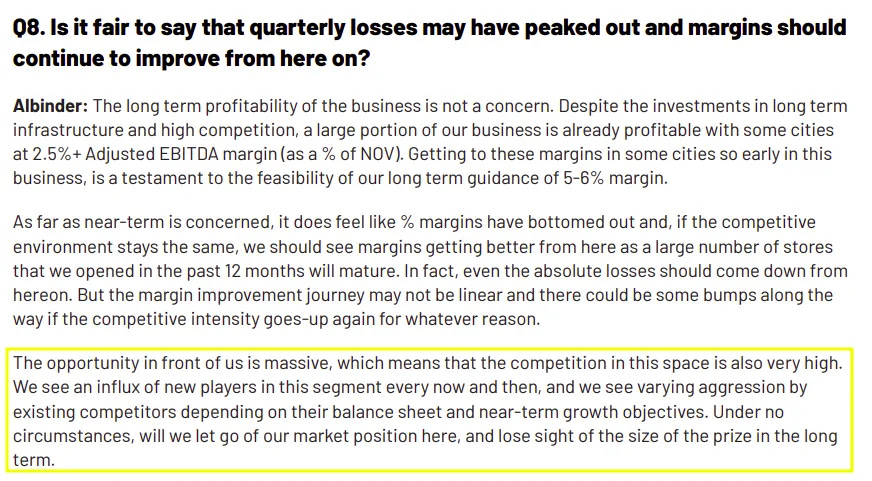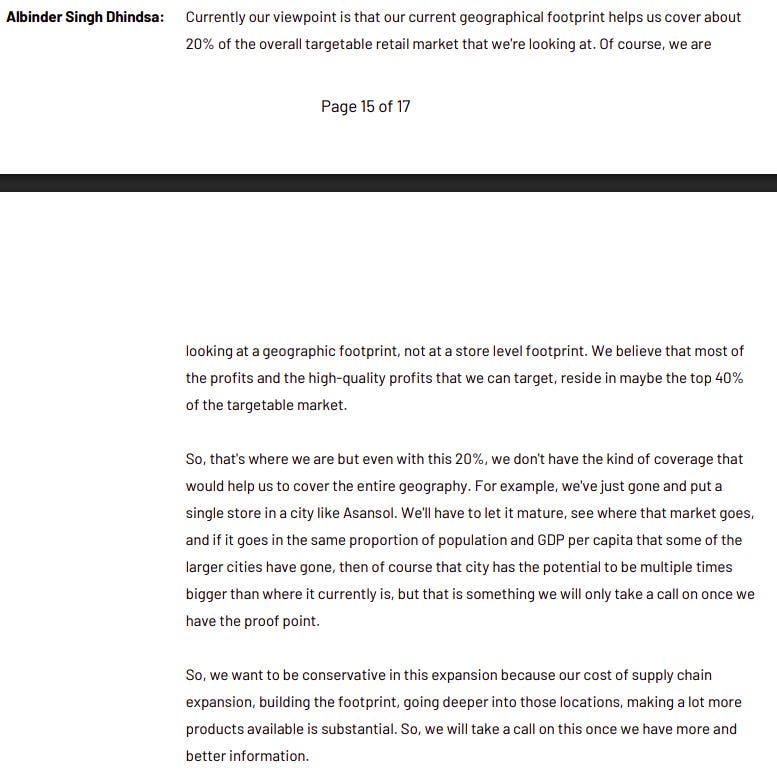Hi folks, welcome to another episode of Who Said What? I’m your host, Krishna. For those of you who are new here, let me quickly set the context for what this show is about.
The idea is that we will pick the most interesting and juiciest comments from business leaders, fund managers, and the like, and contextualize things around them. Now, some of these names might not be familiar, but trust me, they’re influential people, and what they say matters a lot because of their experience and background.
So I’ll make sure to bring a mix—some names you’ll know, some you’ll discover—and hopefully, it’ll give you a wide and useful perspective.
For all the sources mentioned in this video, don’t forget to check out our newsletter; the link is in the description.
With that out of the way, let me get started.
Can Reliance beat the upstarts like Blinkit?
So, Reliance released its quarterly results last week, and it’s one of those companies where you can learn something about almost every part of the economy. There’s retail, oil, telecom, and even television ratings (see the image)
But the part that really caught people’s attention this time—by people I mean Twitter—was Reliance Retail’s comments on quick commerce. This is one space that’s been interesting to track, and I’ve spoken about it here a bunch of times. Last week’s Who Said What was about Blinkit choosing growth over margins. But Reliance’s comments this time were worth pausing on. Here’s what they said:
That line stood out because it gives a sense of how Reliance, which is such a large conglomerate thinks.
The thing is, that behaviour didn’t appear on its own. Over the last three or four years, companies like Blinkit, Zepto, and Swiggy have been burning enormous amounts of cash to make people believe that groceries can arrive in ten minutes and that this is normal. And I want to go ahead and say that it’s worked. It’s now almost hard to imagine life without quick commerce. So yes, the behaviour exists and Reliance is saying it can now use that to its advantage.
And, ofcourse, it’s not an empty claim either. Reliance already has something no one else does: massive scale. The company’s retail network spans over 19,000 stores, and it keeps reminding everyone of that. “Competition is mainly in the top 10, 20 cities,” the management said. “We are present in almost a thousand cities. Competition will take many years to reach where we already have a head start.”
That’s their argument. Blinkit, Zepto, Swiggy—they’re still focused on metros mainly. Reliance, on the other hand, already sits everywhere. So while the smaller players are trying to build density in limited zones, Reliance’s game is to stretch the map itself. Now, all of this is 100% true, but the core of quick commerce isn’t distribution. Its execution.
Here’s how Reliance describes its own setup:
“The dark stores are more in the bigger cities where there are big gaps in the network. Majority of the deliveries are happening from the stores; dark stores are only where there are gaps in the network… to be able to meet the delivery expectations.”
That’s the key sentence. Most orders still go out from regular stores. Which means pickers are walking through aisles designed for shoppers, not for speed. Reliance’s stores are built for people to browse. Quick commerce doesn’t work like that. In Blinkit or Zepto’s world, the picker is the customer. The store layout is the product.
Blinkit’s dark stores, for instance, are built for efficiency. They’re compact, tightly mapped, and designed for a picker to grab, pack, and hand off an order in under two minutes. The average Reliance Fresh, by contrast, is built for display and volume, not movement. So even though Reliance has the network, it doesn’t yet have the design. And in this business, design is the difference between “quick” and “commerce.”
What Reliance does have, though, is assortment. That’s retail language for the number and variety of products on offer. It’s one area where Reliance genuinely wins. Because the company’s supply chain and partnerships give it access to far more SKUs than any quick commerce platform. And it knows what sells where.
“We already know what sells in that region because that is what we merchandise in our stores,” the company said. “That is a big advantage we have.”
The difference, though, is that Blinkit and Zepto understand this through digital behaviour. They see what people search for. They can see what’s missing before it’s even bought. Reliance’s data is backward-looking—it tells you what sold, not what was searched for and abandoned—this was my understanding, please do let me know if I am wrong.
Infact last quarter, Albinber Dhindsa had said this:
“The opportunity in front of us is massive, which means that the competition in this space is also very high… Under no circumstances will we let go of our market position here.”
In the most recent call, he added:
“Our current geographical footprint helps us cover about 20% of the overall targetable retail market… We want to be conservative in this expansion.”
Blinkit’s still focused on building depth before scale. It knows what works in the top ten cities and wants to make that model airtight before it spreads further.
So here’s where both companies stand today. Reliance is saying it can take advantage of the behaviour the start-ups created, using its distribution and pricing power. Blinkit is saying it will win through efficiency and precision.
It will be interesting to see who dominates this space in the future :)
Btw, I came across all of these comments because we run a newsletter called The Chatter where we go through con-calls and management interviews. We then pull out the sharpest quotes from the management and curate them in a crisp newsletter.
What Raghuram Rajan thinks about the rising Gold
Raghuram Rajan, the former Governor of the Reserve Bank of India, has a knack for spotting problems in the system before most people do. Before the 2008 financial crisis, he warned that the world’s financial system had become too fragile, a warning few agreed with at the time, but one that proved right soon after.
So when he speaks about what’s happening now: why gold is surging, why markets feel euphoric, and why trust in global money is eroding its worth listening to.
He recently sat down with Bloomberg’s Odd Lots podcast and what followed was a masterclass in reading between the lines of the global financial order.
The conversation started by asking the most simplest and basic question: Why is gold up so much?
“Right, Well, there’s no single story, right, it’s a number of stories. First it started taking off what twenty twenty three. Clearly there is an element of geopolitical risk. Many central banks, looking at the militarization or the weaponization of payments, are basically saying, do I want all my reserves in developed country currencies? Do I want something which I control directly? So a movement to gold for that reason may have started initially a lot of central banks moving to more gold…”
That shift, he explained, began around 2022, after Russia’s reserves were frozen. When the United States and Europe seized hundreds of billions of dollars of Russian foreign assets, it sent a chill through central banks everywhere. Until then, most countries treated their dollar or euro reserves as untouchable — the ultimate store of safety. But the sanctions showed that those reserves weren’t really theirs if they sat in Western vaults. A single political decision could lock them out overnight.
For Raghuram Rajan, that episode changed the psychology of global finance. It made many governments, especially in Asia and the Global South, ask uncomfortable questions: If my savings can be switched off, am I really sovereign? Should I keep everything in someone else’s currency? That’s when, he says, the quiet move toward self-custodied assets like gold began.
“trust has broken down in the system, and that’s part of the reason why people are trying to build alternatives which don’t make them dependent. Payments are so crucial you don’t want to be dependent on any one country that can change the nature of payments.”
But if this sounds like the beginning of de-dollarisatiom, the great migration away from the U.S. dollar, Raghuram Rajan isn’t convinced.
“Part of the reason is the TINA factor. There is no alternative, right, The US market is still the deepest market in the world… people still trust the rule of law prevailing in the US.”
The world, he says, may be experimenting with new payment systems and local backup networks, but there’s still only one truly liquid, global-scale financial center: the United States.
When asked about BRICS, he was quite blunt.
“The sense that they will come together with a common currency, I mean, forget about it. That’s not going to happen.”
The bloc, he noted, is “much less cohesive and seems much more like a anti-West kind of structure, which certainly India doesn’t subscribe to, which Brazil probably doesn’t subscribe to.”
At best, he said, countries might “build up a payment system which is different… Gives me diversification. If somebody tries to put the squeeze on me, I move to a different payment system. But does that mean I’m going to quote with a currency. Probably not.”
That mixture of distrust and dependence, losing faith in the system yet unable to leave it, has created what he calls an odd kind of fragility. On one hand, everyone’s hedging. On the other, everything still rests on the same foundation.
And it isn’t just geopolitics. He spoke at length about how easy money and years of government support have left markets standing on shaky foundations. “He warned that much of the world today feels, as he put it, ‘priced for perfection’ — a place where everyone’s acting like the good times will never end, even though they always do
There was more, of course. He went deep into what he sees as the next big risk, the boom in AI investment, the return of speculative credit, and the fading political consensus that once held strong institutions together. It’s a wide-ranging conversation and you should definitely listen to the full episode.
That’s it for this edition. Thank you for reading. Do let us know your feedback in the comments.
Introducing In The Money by Zerodha
The newsletter and YouTube channel aren’t about hot tips or chasing the next big trade. It’s about understanding the markets, what’s happening, why it’s happening, and how to sidestep the mistakes that derail most traders. Clear explanations, practical insights, and a simple goal: to help you navigate the markets smarter.










This is not Reliance's first foray into quick commerce; JioMart Express was back in 2021. The company quietly shut it down 2 years later. The company had also invested in Dunzo for q-comm and that too failed. With all their wealth and stores, reliance retail has a horrendous track record in this area. Third time's the charm? We'll see.